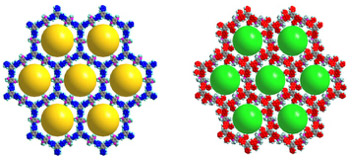
Scientific Achievement
Foundry staff and users have developed a method that makes COFs, highly-customizable porous frameworks, more sturdy and gives them new properties.
Significance and Impact
The new method creates COFs that are some of the most robust ever made and also have new optoelectronic properties. The modification could make COFs useful in filtration, recycling carbon dioxide, or facilitating chemical processes.
Research Details
- The chemical bonds that link Covalent Organic Frameworks (COFs) into larger structures are unstable in harsh chemical environments, limiting practical use of COF materials.
- The research team applied a known chemical reaction on the weak links between COFs and transformed them into bonds that are exceptionally resilient.
- The simple reaction not only strengthens the chemical bonds, but also gives the material semiconducting properties. 2-D layers of the COFs behaved similar to graphene.
- The researchers used high-resolution transmission electron microscopy (HRTEM) at the Molecular Foundry to image the structure of the bound COFs, confirming the chemical change and finding that the pore size shrank by 0.3 nm after the reaction.

